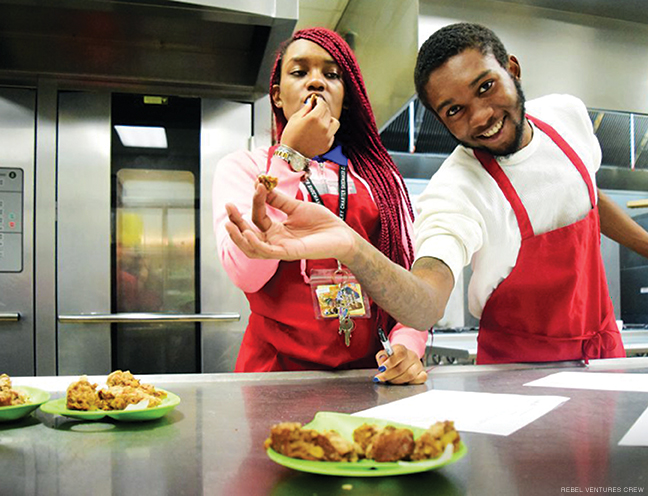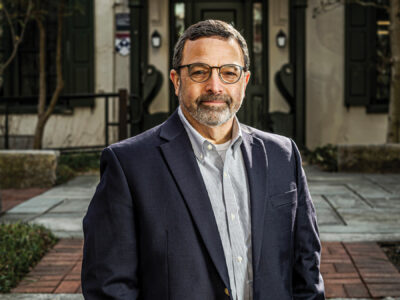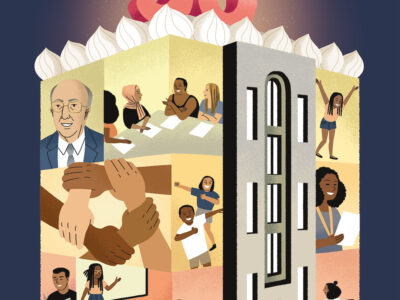
Fleshae Arbur Seay and Nasir Laney testing recipes.
Rebel Crumbles have a knack for defying expectations. For starters, despite their suggestive name, the snack-size apple-cranberry treats do not in fact fall to pieces at first bite.
The pastry, created by Philadelphia high school students with support from Penn’s Netter Center for Community Partnerships, embodies a new model for tackling nutrition and building career skills in public schools. This year, Rebel Crumbles became the first known student-made product to be included on the Philadelphia School District menu. This spring, children at every public school in the city will consume over 250,000 crumbles through the district’s breakfast program.
The success of the enterprise hinges on its student-first philosophy, putting teenagers in charge of the entire life cycle of a growing line of products.
On a snowy March afternoon, students from several city schools were hard at work trying out new recipes in the stainless-steel kitchen of the Center for Culinary Enterprises in West Philadelphia. “We’re creating healthy deliciousness for students throughout Philadelphia,” said Tre’Cia Gibson, a junior at Parkway West High School, reciting the group’s unofficial slogan.
“We are young entrepreneurs,” said Zaire White, a Parkway West sophomore, while he sliced apples to add to a bowl of batter. “We know what people our age like to eat.”
They work under the aegis of Rebel Ventures, a nonprofit guided by executive director Jarrett Stein C’09, who also directs partnerships and social ventures at the Netter Center’s Agatston Urban Nutrition Initiative. Stein, who projects an informal but earnest manner, emanates a passion for food and nutrition that he developed after surviving a bout of childhood cancer. As a Penn freshman he took an ABCS (academically based community service) class called “Politics of Food,” for which he helped teach adult nutrition classes with families living in West Philadelphia. “People had a great desire to eat healthy food but a lack of exposure to fruits and vegetables and information about healthy eating,” he recalls.
Many Philadelphians in poor neighborhoods face an uphill struggle finding quality food, but live amidst a profusion of cheap, sugary snacks lining corner-store shelves. Public health indicators reflect this state of affairs. As of 2013, more than 20 percent of Philadelphia public school children met the medical criteria for obesity or severe obesity, according to the Philadelphia Department of Public Health. That puts them at elevated risk for high blood pressure, high cholesterol, cardiovascular disease, breathing problems, and Type 2 diabetes.
Stein saw schools as an opportunity to intervene. After he graduated, he took a position via the Netter Center as a nutrition teacher serving middle schools in South and Southwest Philadelphia. He soon made a discouraging discovery: his students were completely unresponsive to being lectured about healthy eating.
“I was a horrible teacher,” he says. “It was a failure.”
He turned to Mary Summers, who had taught that “Politics of Food” class, for mentorship. Summers, a lecturer in political science and senior fellow at the Fox Leadership Program, suggested he focus on building relationships with the kids, not talking at them.
“Lecturing poor people about how they should eat has proven to be ineffective as a way of changing people’s habits,” she says. “I much prefer the idea that what we’re doing is getting kids excited about having skills they can use in their lives that are fun.”
Stein changed tactics and asked his students what they thought could be done to create healthier schools. A group at Pepper Middle School suggested selling healthy snacks in school stores, and began to develop a granola bar recipe. The students coined the label Rebel to symbolize pushing back against an adult-controlled food system. “It was clear middle school kids didn’t want to be told what to do,” Stein says. “The idea was kids controlling their own food and rebelling against the status quo.”
As the students gained confidence as food entrepreneurs, they decided to expand their product beyond school stores and create something that could be included with the district’s free meals program. District officials were open to the idea, but their requirements posed hurdles. The crew had to massively scale up production capabilities while offering a snack that contained 32 grams of grains, half of them whole grains, and half a cup of fruit.
For help, Stein reached out to Jon Liss W’76, president of Michel’s Bakery in Northeast Philadelphia. Liss agreed to help, and his pastry chef worked with the students to create a recipe the bakery could produce at scale. They spent a year and a half testing dozens of variations, leading eventually to an apple cranberry crumble-cake recipe inflected with cinnamon.
“These high school kids understand what it’s like to go from conceptual product development to trials, package design, all the way to introduction into the marketplace” Liss says. “They’re getting an insight into the business world.”
The enterprise isn’t sustainable on its own yet, although that is a key goal moving forward. For the moment it leverages financial and other resources from Penn, including coordination with students and faculty from the schools of Law, Nursing, Design, Arts and Sciences, Social Policy and Practice, and Wharton. The nexus of collaboration is the Netter Center, where associate vice president and director Ira Harkavy C’70 Gr’79 sees mutual benefit to Penn and Philadelphia.
“The engagement with the community serves both to improve the quality of life and learning in the community, and the quality of researching, teaching, and learning in the University,” Harkavy says. “You’re bringing people together to help contribute solutions to universal problems manifested locally.”
Rebel Ventures is working on expanding its client base to Archdiocese schools and Philadelphia Parks and Recreation functions. In the meantime students at the kitchen remain busy, preparing varieties of banana apple cakes they plan to taste-test with middle school students. Employees Jahzaire Sutton and Zanayja Miller take a break from chopping to film a promotional video for social media with Kevin Dixon, the group’s cinematographer, while Corinthe Hamilton, the crew’s partnerships mentor, takes notes on the afternoon’s progress.
Hamilton is an exemplar of the venture’s potential. The 19-year-old credits the skills and experience he gained at Rebel with helping him advance toward a degree in business management at Community College of Philadelphia. “I learned Excel, progress reports, loss summary, data collection, inventory,” he rattles off. “The students do everything. This is stuff that empowers you.”
—Aaron Kase




